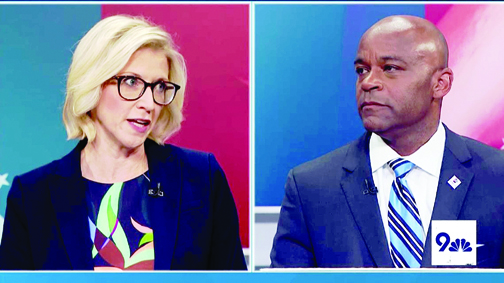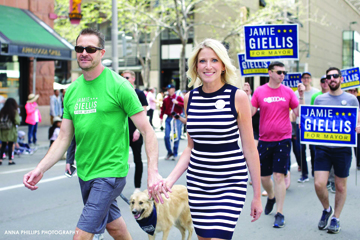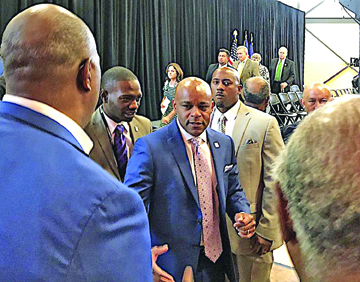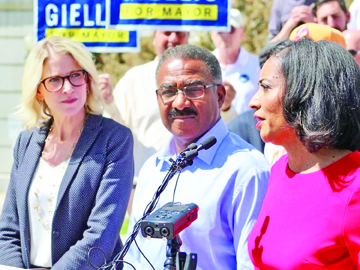Hancock Campaign Goes Hyper Negative
by Glen Richardson

In the May 7 Denver Municipal Election two-time incumbent Mayor Michael Hancock received only 38.65% of the vote and his prior pledge to not campaign negatively went very much out the window. Led by the Brownstein Farber Law Firm, the lobbying firm CRL Associates, Colorado Concern and myriad “high-density developers,” money has poured into the Hancock campaign to muddy up political neophyte Jamie Giellis who finished second with 24.86% of the vote.
Hancock had hoped, and expected, to receive over 50% of the vote and had only run positive ads about himself and his affability, which apparently was not effective as over 60% of Denver voters voted for someone other than Hancock. After election night, two other main challengers Lisa Calderón and Penfield Tate endorsed Giellis. Hancock, in response, garnered the support of former mayors Wellington Webb and John Hickenlooper.

Giellis, who had never run for political office before, appeared shocked at first by the Hancock onslaught and appeared ill-prepared for the inevitable claim by the Hancock forces that she was a “racist.” Giellis had appeared on the Brother Jeff Fard’s radio show and did not correctly identify what each of the letters in the acronym NAACP stood for. The failure to correctly identify each of the letters made national news.
Not being a seasoned politician, Giellis did not scrub all of her social media when she entered the mayor’s race, and what she asserts are seemingly innocent observations were recast as being “racist.” Her notation that in some cities there were seemingly few Chinese in today’s Chinatowns was claimed to be anti-Asian. A tweet for a “meet & greet fundraiser at La Cocinita for a nacho/taco bar, lowriders, and a conversation about Denver on May 16” was declared by the Hancock campaign to be anti-Hispanic even though the event was titled such by the owner of La Cocinita restaurant, a Hispanic, and not Giellis.
On Saturday, before the ballots went out on May 20, Hancock began television ads which stated, “like Trump, (Giellis) called undocumented immigrants criminals.” A Denver Post fact checker reputed the claim but the ad has appeared to be effective even if apparently dishonest.

Giellis did, however, appear to rebound. Lacking money for television ads she had a press conference where she accused Hancock of fostering a “poisonous culture” of sexual harassment with graphs showing Denver taxpayers paying nearly $1.5 million in settlements and legal fees during Hancock’s eight years in office.
A review of where each of the candidates performed best in the May 7 election shows that Giellis performed best in the areas where many developers had inserted projects, often against the wishes of the surrounding neighborhoods, including Cherry Creek, Hilltop, Crestmoor, Country Club and Virginia Village. Hancock performed best in his northeast Denver home turf as well as outlying areas where high-density development has not yet occurred.
A major bone of contention between the candidates is the issue of homelessness. Both opposed and voted against Initiative 300 the so-called “Right to Survive” ballot issue which went down to a crushing defeat. Hancock supports the “camping ban” that prevents camping overnight on city property. Giellis does not support the ban as she believes all it does is try to sanitize downtown and push the homeless into the local neighborhoods. She proposes a combination of designated campsites in sanitary locations along with tiny home locations to address the problems of homelessness.
Hancock, with a massive fundraising advantage, hopes that his name recognition and advertising campaign will win out in the end. Giellis, who personally toured every neighborhood in Denver, hopes her person-to-person campaigning will defeat what she views as a cynical negative advertising blitz being relied on by the mayor.

The last time an incumbent mayor lost in Denver was in 1983 when a young Federico Peña defeated 74-year-old incumbent Bill McNichols. Hancock is deemed the favorite, notwithstanding getting less than 40% of the vote in the first round. Almost 40% of the Denver electorate turned out in the first round which was far higher than expected. The higher the turnout the better the chances of the challenger, according to experts, as citizens happy with the status quo often tend not to vote.
The runoff election is set for June 4, 2019, and ballots have already been mailed by the City and County of Denver.
